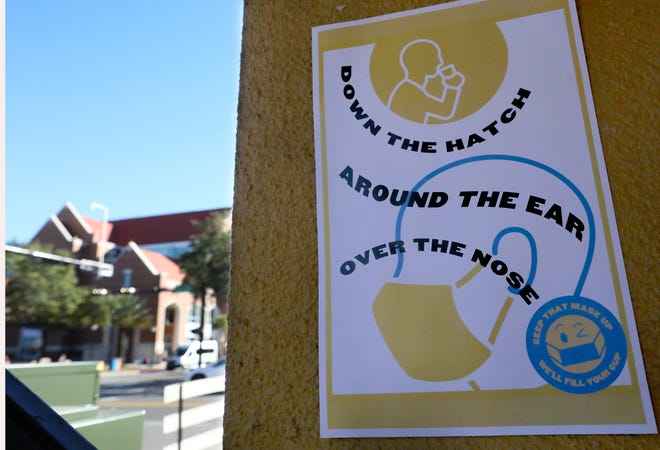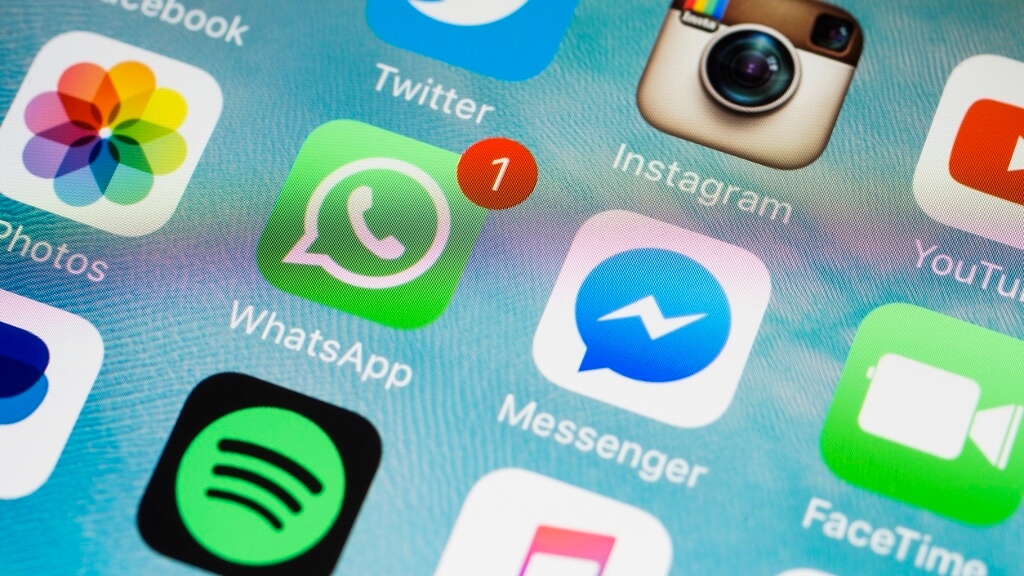UF student marketing plan encourages masks in bars

JD Chester is unsure how well a new marketing effort developed by a University of Florida journalism program to convince students to wear masks in bars and restaurants will work.
But he said it was worth a try.
The owner of several downtown bars, including the Rowdy Reptile, Fat Daddy’s and JJ’s Tavern, is among the first Gainesville business owners to receive marketing materials developed by students – and paid for by the city – to remind students to wear masks before and after imbibing.
The campaign includes T-shirts, logo masks, posters, floor decals, mirror stickers, coasters and other marketing materials, among other things.
The students who presented the plan to the Gainesville City Commission last week said the message would be from a “kind of cool cache,” in upbeat language that students can relate to and which is definitely not dictated or preached, which might be met by backlash.
The commission allowed staff to continue the program, saying that even if only a few students changed their behavior, it could save lives.
Continued:Alachua County leaders stop pushing to reduce restaurant and bar capacity
Continued:Despite the virus, some find the nightlife irresistible
Chester said he had tried everything in his power — mostly to no avail — to convince students in his downtown bars to wear masks.
He said he typically only operates his bars at 75% capacity and his employees continually remind customers to wear their masks, but that’s a tough sell. He said most students say they’ve had the coronavirus before and believe they have the antibodies, so they’re throwing caution to the wind. Chester said he was convinced that if bars were closed, students would simply flock to other places to party, such as homes, which could lead to further spread of the coronavirus.
Chester said he was completely on board with the proposed marketing scheme.
“I think anything we can try to do to reduce the COVID footprint is worth trying,” he said. “Contrary to popular belief, we aim for the symbiosis of enabling our businesses to succeed and not fail, while doing our best to keep everyone safe.”
The program involves positive ‘nudges’ and a ‘social normalization approach’ to remind students to wear their masks when in restaurants and bars instead of trying to dictate or shame students into put on the masks.
“Social norms are perceptions of the behaviors of people like us,” said Ann Christiano, director of the Center for Public Interest Communications during a presentation to the city commission last week.
UF student Sammie Green, the project manager, said the campaign is designed to get the attention of students, who often ignore signs posted in bars and restaurants asking them to wear masks.
“We really wanted to focus on ‘do’s’ behaviors, not ‘don’ts’,” she said.
She said it involves using language that resonates with the targeted community of young students “who want to see it come out safely and also as part of a long student experience.”
Green said the goal was also to convey messages that stand out in loud bars and clubs.
“We want students to recognize them,” Green said.
Green said the marketing materials the students developed “also associate specific behaviors with rewards, laughter, playfulness and joy.”
Masks have been designed for bartenders with sayings encouraging patrons to wear masks as well, with sayings such as “Mask And You Shall Receive” and “Want a glass? Wear a mask.”
“He’s like, ‘It’s okay you want a drink, do it safely,'” Green said.
Colorful masks have also been designed for students to wear in bars with playful sayings such as “Mask Me For My Number” and “Only Here For The Beer”.

The students also designed posters to hang outside a bar reminding them to take their masks with them to bars.
A drawing shows a hand holding a cell phone with a mask hanging from the person’s wrist, with the words: “Keys, Phone, Wallet and Mask”. Another said, “Don’t Forget. Your Mask Is Sexy.
Floor decals have also been designed which will be spaced six feet apart outside the bars for students to walk on while queuing to help with social distancing. One of the designs of a winking smiley face wearing a mask says, “Make happy hour happy hour.”
UF student Stephanie Strickland, who was also part of the research team, presented the commission with designs for marketing materials that would go inside the bars.
Countryside bartenders wore T-shirts urging students to wear masks. Coasters would also encourage students, with one showing a mask wrapped around a drink with the saying “Salt, Shot, Lime, Mask”.
Strickland said the intention is not to make students feel looked down upon for drinking in a bar, simply adding to the experience “in a way that is safe for our community.”
Signs encouraging students to wear masks are also said to be in various places inside the bar, in places that students frequent after walking through the door. For example, it is proposed to affix stickers to bathroom mirrors and posters hung on the doors of bathroom cubicles encouraging the wearing of masks.
The commission praised the scheme last week, but many questioned whether it would be effective enough without a hammer to accompany it, such as the reduction in permitted bar occupancy and a fine for bar owners. company whose customers do not wear masks. Alachua County has decided not to take these actions at this time, and City of Gainesville officials are waiting to see what county commissioners do before making their decision.
Most bars and restaurants are within the city limits.
Mayor Lauren Poe said earlier this week the city is moving forward with the marketing program because even a small change in behavior could be life changing.
“What we are looking for are potential funding partners, so we are having discussions with different people on how to proceed,” he said.
Poe said that while the campaign may not convince large numbers of students to wear masks in bars and restaurants, it’s worth it.
“The current situation is about as bad as it can get, so any improvement from there is incremental success,” he said.



